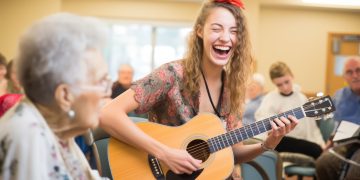As we enter the holiday season and move into 2025, it’s more important than ever to expand what our music communities look like to strengthen them and increase participation and create better dialogue.
As music educators, you work diligently to nurture young musicians and create vibrant musical ensembles within your schools. However, it can be easy to overlook the larger community that exists outside your classrooms—those individuals who may have once aspired to play music but never found the opportunity, or those who simply enjoy listening and wish to engage further.
This is an ideal time for music teachers to think about ways they can extend the gift of music to their communities in 2025.
- Showcase School Ensemble
One of the most effective ways to share the love of music is by showcasing your school’s ensembles to the broader community. Consider these approaches:
- Community Concerts: Host performances at local parks, community centers, or public libraries where everyone is welcome. Celebrate the diverse talents of student musicians through themed concerts, such as holiday music or traditional folk songs. Promote these concerts through local community boards, social media, and flyers distributed around town to attract a diverse audience.
- Perform at Local Events: Partner with local events, such as farmers’ markets, festivals, or holiday celebrations, where your students can perform. Having students play for non-musical attendees helps demystify music and invites them to engage with the performance.
- Invite Community Members to Perform: Involve local musicians or alumni to participate in your concerts, creating a bridge between the school and the community. Collaborations can inspire non-musicians by displaying the shared love for music, encouraging them to consider exploring their musical inclinations.
- Connect with Private Lesson Teachers
In your area, private lesson instructors can be powerful allies in promoting music education. By collaborating with these teachers, you can create a sense of unity within the musical community. Here are some ideas:
- Resource Sharing: Build a network of private lesson teachers and organize joint events such as masterclasses or workshops. This gives aspiring musicians, and non-musical participants access to different learning styles and resources.
- Referral Programs: Work with local music teachers to establish referral programs that connect your students with those interested in private lessons. When community members see their peers involved with music, it can motivate them to try their hand at playing an instrument.
- Joint Recitals**: Organize recitals featuring both your school ensembles and private lesson teachers. Encourage students from both settings to collaborate, sharing the stage and the spotlight in a friendly environment that emphasizes community over competitiveness.
- Engage with Other Musical Groups
Actively seek collaborations with other musical organizations, such as local choirs, bands, or arts organizations. Create opportunities for interaction:
- Cross-Promotion: Partner with local choirs or bands to host joint events or performances. This could include themed concerts where multiple ensembles come together to showcase their talents. Such events can attract non-musical community members for an exciting afternoon of music.
- Music Workshops: Invite local musicians to hold workshops at your school or community center. Fundraisers or casual community events can serve as platforms for both musical education and enjoyment. Offer workshops that cater to differing skill levels and interests, appealing to those who wish they had more opportunities to play.
- Participate in Local Arts Festivals: Engage with local arts festivals by setting up booths or workshops where non-musicians can try out different instruments, learn about music, and even create a simple tune. This upbeat environment encourages engagement and creates lasting memories.
- Create Inclusive Events for All Ages
Recognizing the desires of individuals who may have always wanted to engage with music, consider developing inclusive events designed for diverse age groups and skill levels:
- Music Discovery Days: Organize events that introduce various instruments, allowing participants to experiment. Create stations where community members can try playing different instruments, inspired by fun activities suitable for all ages.
- Holiday Musical Gifts: Encourage students to invite family and friends to special performances during the holiday season. Consider creating “musical gift packages” that allow non-musicians to participate—like a “family member joins in” segment where relatives can play along or sing during the performance.
- New Year’s Resolutions: Promote initiatives that align with New Year’s resolutions, such as a community-wide challenge to learn an instrument. Support these participants by providing resources, group lessons, or a social media platform to share their musical journey.
As music teachers, we possess the gift of sharing the love of music, creating opportunities for community connection and engagement. By showcasing school ensembles, connecting with private lesson teachers, collaborating with other musical groups, and creating inclusive events, we can reignite musical passions in our communities. This holiday season and beyond, let’s strive to cultivate a broader audience for music, transforming those who have longed to play into active participants. Together, we can create a harmonious community that celebrates music, inspires creativity, and honors the beautiful gift of sound.
You may also like:
 SBO Presents the 21st Annual 50 Directors Who Make a Difference
SBO Presents the 21st Annual 50 Directors Who Make a Difference
 The 22nd Annual 50 Directors Who Make a Difference
The 22nd Annual 50 Directors Who Make a Difference
 2011 ’50 Directors Who Make a Difference’ Report
2011 ’50 Directors Who Make a Difference’ Report
 Our 24th Annual 50+ Directors Who Make a Difference
Our 24th Annual 50+ Directors Who Make a Difference
 The 23rd 50 Directors Who Make a Difference Report
The 23rd 50 Directors Who Make a Difference Report
 50 Music Teachers Who Make a Difference
50 Music Teachers Who Make a Difference





















